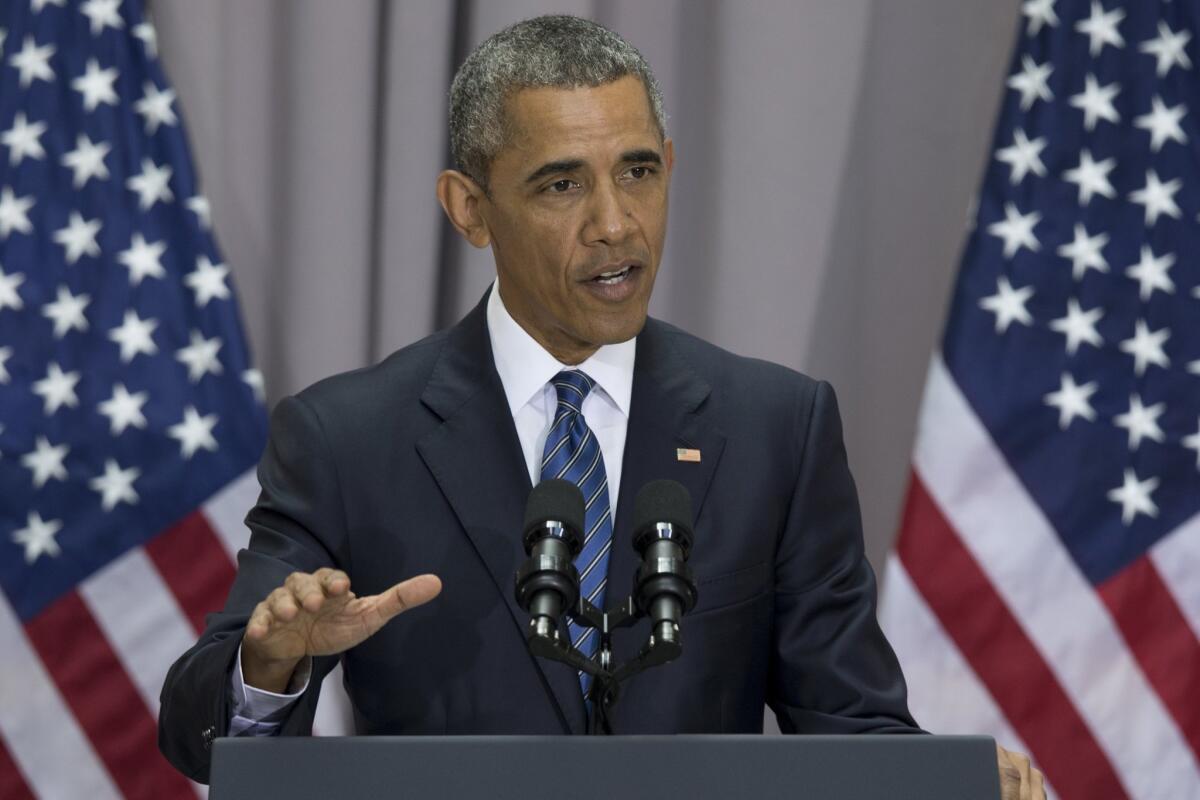Rep. Sherman joins foes of Iran nuclear deal

President Obama speaks about the nuclear deal with Iran on Wednesday at American University in Washington.
- Share via
Reporting from Washington — Another Democrat, Rep. Brad Sherman (D-Sherman Oaks), announced Friday that he will vote against the nuclear deal with Iran, and urged a renegotiation of its terms as soon as President Obama leaves office.
Sherman, a member of the House Foreign Affairs Committee, declared his opposition the day after Sen. Charles Schumer (D-N.Y.), the Senate’s No. 3 Democrat, and Rep. Eliot L. Engel, (D-N.Y.), ranking member of the House Foreign Affairs Committee, said they opposed the president’s landmark foreign policy initiative.
The defection of Schumer, who is expected to be the Democrats’ next leader in the Senate, brought a backlash from some former Obama aides and Democratic liberals.
Dan Pfeiffer, former White House communications director, tweeted that Schumer’s opposition “will make it hard for him to lead the Dems in ’16.”
So far, the few Democrats who have publicly broken with the White House represent states or districts with large Jewish populations. Israel’s prime minister, Benjamin Netanyahu, has vehemently condemned the deal, and the issue has sparked heated debate in the nation’s Jewish communities.
California’s two Democratic senators, Dianne Feinstein and Barbara Boxer, who are both Jewish, have come out in support of the deal. So has Rep. Adam Schiff (D-Burbank), the top Democrat on the House Intelligence Committee.
Sherman said in a statement that though the agreement includes good and bad features in its first year, it “gets ugly in the years thereafter.”
“In 15 years or less, Iran is permitted to have an unlimited quantity of centrifuges of unlimited quality, as well as heavy water reactors and reprocessing facilities,” he said. “We must force modifications of the agreement, and extensions of its nuclear restrictions, before it gets ugly.”
Although Republican opposition is likely to be nearly unanimous, most lawmakers and analysts believe the White House is likely to win enough Democrats to ensure Congress cannot kill the deal, which was negotiated with Iran by the United States and five other world powers.
Congress, which is on August recess, has until Sept. 17 to approve or disapprove the deal, or not to vote at all. Obama has vowed to veto a resolution of disapproval, if necessary, and needs enough Democrats to make sure opponents can’t override his veto and kill the deal.
Sherman, like many other critics, said he hopes the next president can renegotiate the deal to make it more favorable to U.S. interests. The agreement limits Iran’s ability to develop a bomb for at least a decade in exchange for easing of economic sanctions.
A strong congressional vote against the agreement “is the best way to make it clear that the agreement is not binding on Congress, the American people or future administrations,” he said. The deal is an executive political agreement and not a formal treaty, he noted.
In an interview, Sherman said the agreement will restrict Iran’s nuclear activities in its first years, while Obama is still in office, but will become more lenient as time passes.
Obama “is setting it up so that his successor will have to deal with ‘nukes gone wild’ from Iran,” he said.
Sherman said he is concerned that Iran can delay inspections of suspected nuclear sites up to 24 days under terms of the deal, and that it would release cash to Iran that it could use to purchase nuclear weapons from North Korea.
He said U.S. policymakers should also be concerned with Iran’s aggressive behavior in Syria, and the activities of its armed proxy groups.
For foreign policy news, follow me at @richtpau
More to Read
Sign up for Essential California
The most important California stories and recommendations in your inbox every morning.
You may occasionally receive promotional content from the Los Angeles Times.














